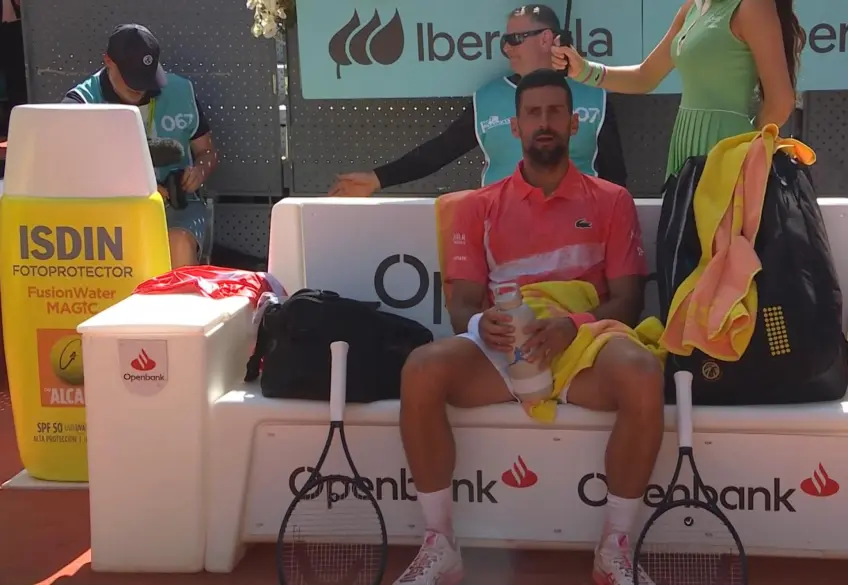
In the high-octane world of professional tennis, where the pursuit of titles defines a player’s legacy, Novak Djokovic is navigating uncharted territory. The 37-year-old Serbian legend, with 24 Grand Slam titles to his name, recently opened up about a profound shift in his mindset as he approaches the twilight of his illustrious career. Ahead of the 2025 Madrid Open, Djokovic admitted that not being in the driver’s seat for titles feels “strange” and “completely different” from the relentless ambition that fueled his dominance for two decades. His candid reflections offer a rare glimpse into the psyche of a champion confronting the inevitability of time and the challenge of redefining success.
Djokovic’s 2025 season has been a rollercoaster, marked by flashes of brilliance and unexpected struggles. After reaching the semifinals of the Australian Open, where he fell to eventual champion Jannik Sinner, and clinching a title at the Shanghai Masters, the Serbian has faced a string of early exits, including a shock third-round loss at the Monte-Carlo Masters. “It’s completely different feelings from what I had 20 years of professional tennis,” Djokovic shared in a poignant interview. The man who once seemed invincible, holding all four Grand Slam titles simultaneously in 2015-16, now finds himself adjusting to a reality where victories are no longer guaranteed. “I guess the circle of life and the career eventually was going to happen,” he added, a nod to the natural ebb and flow of an athlete’s journey.
This new phase is not just about results but a fundamental shift in priorities. Djokovic has been vocal about moving away from chasing ATP rankings or events like the ATP Finals, which he once dominated with six titles. “Torino is not my goal at all, to be honest, I am not chasing ATP Finals, I am not chasing the rankings,” he declared in 2024, a sentiment that has carried into 2025. Instead, his focus has narrowed to Grand Slams and representing Serbia, a choice that reflects both his legacy and his desire to savor moments that matter most. “From now on, priorities are gonna be Grand Slams and playing for Serbia,” he reiterated, emphasizing a selective approach to tournaments as he manages his physical and mental energy.
The emotional weight of this transition is palpable. Djokovic admitted that accepting losses—once an anomaly in his career—is now his “biggest challenge.” “I’m not going into Roland Garros as one of the favorites,” he said, a striking admission from a player who has won the French Open three times. Social media posts from fans and analysts have sparked debate, with some interpreting his words as a sign of a fading champion’s mentality, while others see it as a mature acknowledgment of his evolving role in a sport increasingly dominated by younger stars like Sinner and Carlos Alcaraz. “He’s lost his champion’s mentality,” one X user lamented, while another countered, “He’s just being real about where he’s at.”
On the court, Djokovic’s performance at the Madrid Open reflects both his enduring skill and the challenges of his new reality. Facing 21-year-old American Christopher Eubanks in the second round, Djokovic delivered a 6-4, 7-5 masterclass, showcasing his trademark defensive prowess and pinpoint backhands. “I still feel the fire for the big moments,” he said post-match, a reminder that his competitive spirit remains intact. Yet, the match also highlighted his vulnerability, as Eubanks pushed him to the brink in the second set, forcing Djokovic to dig deep to avoid a tie-break. His next opponent, either Casper Ruud or Jordan Thompson, looms as another test in a tournament where he’s a four-time champion but no longer the odds-on favorite.
Off the court, Djokovic’s reflections reveal a man grappling with his place in tennis history. With 99 career titles, he’s one shy of the century mark, a milestone that once seemed inevitable but now feels secondary to his broader goals. “Not chasing titles feels strange,” he confessed, a sentiment that resonates with fans who’ve watched him redefine greatness. His decision to skip lower-tier events like Indian Wells and Miami in 2025, coupled with his focus on clay preparation for Roland Garros, signals a strategic pivot to maximize his chances at the majors.
As the clay season unfolds, Djokovic’s journey is a compelling blend of defiance and acceptance. He’s no longer the untouchable force of his prime, but his hunger for Grand Slam glory persists. “I still want to make history,” he said, a vow that keeps fans hopeful. Whether he can reclaim his throne or must settle for inspiring the next generation, Djokovic’s candid embrace of this “strange” new reality cements his legacy as not just a champion, but a human navigating the complexities of time.
Leave a Reply